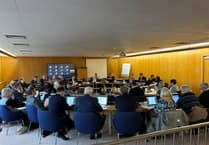CORNWALL Council is asking residents for their views on proposals to add food waste to weekly recycling collections and to collect any remaining waste that cannot be recycled on a fortnightly basis.
This system is used extensively by other councils in England and Wales and would help increase Cornwall’s recycling from its current rate of 37.5% which is below the national average.
The current waste and recycling contract for Cornwall comes to an end in 2020, and the council is looking at what Cornwall’s waste and recycling collections should be when the new contract begins in April 2020.
Cornwall Council cabinet member for environment and public protection, Sue James, said: “We recently took a look at the contents of black bin bags. On average, we know that most people’s waste is currently comprised of 22% materials that could be recycled, such as paper, cans and glass, 35% food waste and 43% other residual waste. If we change collections so people can recycle the 50% of content don’t currently recycle, we can make a big difference to the environment.
“Evidence from other local authorities shows that by making recycling collections more frequent, increasing the range of materials that are recycled and introducing food waste collections on a weekly basis, we can deliver our recycling targets.
“We want to engage with residents between now and the cabinet decision in February to ensure that we understand how the proposed changes would affect local people and what we can do to help them recycle more.
“We hope you’ll take the time to take part in our survey to help us shape the service we provide in the future and tell us how we can help you recycle more for Cornwall.”
One of the council’s key priorities is to reduce the amount of waste produced by residents and businesses in Cornwall and increase the levels of recycling. Reducing waste stops valuable resources being incinerated, saves money and is better for wildlife.
The proposals for the new waste and recycling contract mean that food waste would still be collected weekly and could be recycled by anaerobic digestion instead of going to landfill or for incineration as it currently does. Weekly recycling collections would also make it more convenient for people to recycle.
The council has been talking to town and parish councils about the new waste and recycling proposals via a series of localism summits.
The council is asking people to share their thoughts in an online survey at www.cornwall.gov.uk/recyclingsurvey by January 3 to help it understand the impact of the proposed changes on people in Cornwall. People can also download and print a paper copy of the survey and return it to: Recycling and Waste Survey, Room 4S, County Hall, Truro, TR1 3AY.
Cornwall Council’s cabinet will meet in February to make the final decision on the new waste and recycling contract.





Comments
This article has no comments yet. Be the first to leave a comment.